Cross-Cultural Management: Leadership in a Globalized World
VerifiedAdded on 2021/06/17
|11
|2723
|65
Essay
AI Summary
This essay critically examines the evolution of cross-cultural management to global leadership, drawing insights from Bird and Mendenhall's work and other literature reviews. It explores the significance of cultural heterogeneity and diversity in shaping effective leadership in a globalized world. The essay analyzes the impact of globalization on business models, the emergence of managerial leadership, and the increasing overlap between leadership and management roles. It highlights the need for managers to adapt to the changing landscape and emphasizes the importance of cross-cultural competencies, transformational leadership, and the integration of global and local values. The essay also reviews literature on etiquette, communication, and organizational culture to provide a comprehensive understanding of cross-cultural leadership and its implications for business success. The author concludes that cross-cultural leadership is essential for navigating the complexities of a diverse and interconnected world.
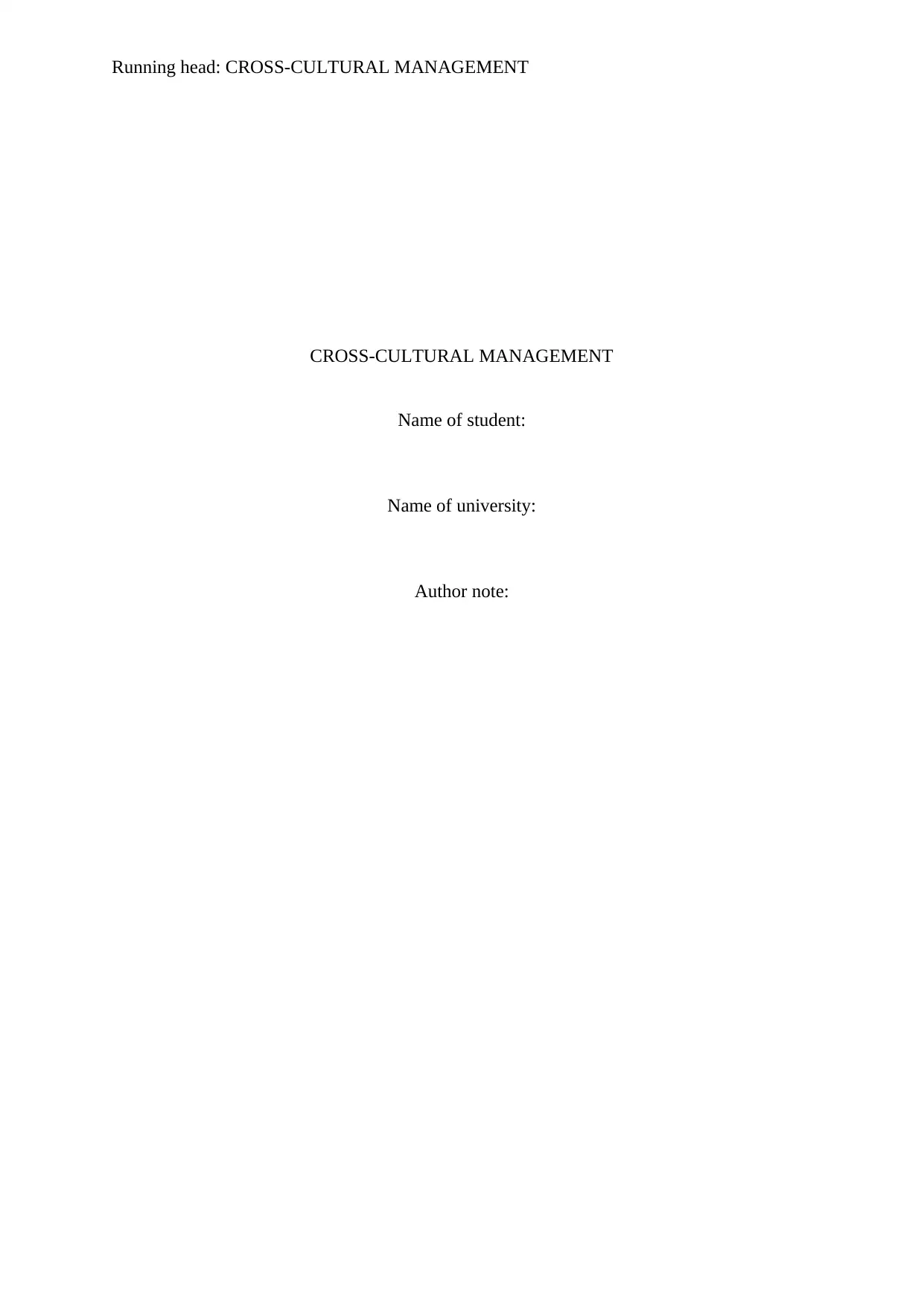
Running head: CROSS-CULTURAL MANAGEMENT
CROSS-CULTURAL MANAGEMENT
Name of student:
Name of university:
Author note:
CROSS-CULTURAL MANAGEMENT
Name of student:
Name of university:
Author note:
Paraphrase This Document
Need a fresh take? Get an instant paraphrase of this document with our AI Paraphraser
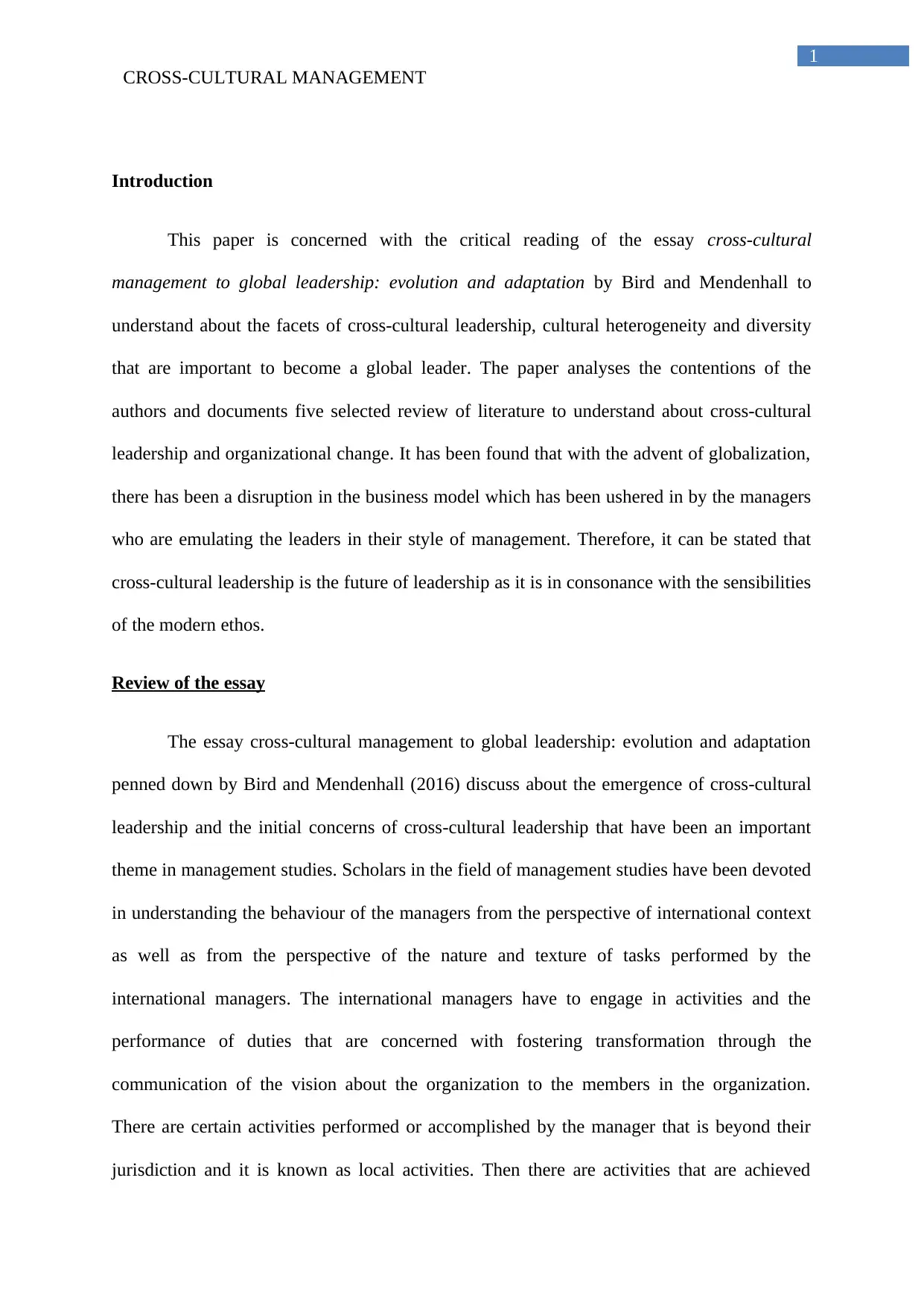
1
CROSS-CULTURAL MANAGEMENT
Introduction
This paper is concerned with the critical reading of the essay cross-cultural
management to global leadership: evolution and adaptation by Bird and Mendenhall to
understand about the facets of cross-cultural leadership, cultural heterogeneity and diversity
that are important to become a global leader. The paper analyses the contentions of the
authors and documents five selected review of literature to understand about cross-cultural
leadership and organizational change. It has been found that with the advent of globalization,
there has been a disruption in the business model which has been ushered in by the managers
who are emulating the leaders in their style of management. Therefore, it can be stated that
cross-cultural leadership is the future of leadership as it is in consonance with the sensibilities
of the modern ethos.
Review of the essay
The essay cross-cultural management to global leadership: evolution and adaptation
penned down by Bird and Mendenhall (2016) discuss about the emergence of cross-cultural
leadership and the initial concerns of cross-cultural leadership that have been an important
theme in management studies. Scholars in the field of management studies have been devoted
in understanding the behaviour of the managers from the perspective of international context
as well as from the perspective of the nature and texture of tasks performed by the
international managers. The international managers have to engage in activities and the
performance of duties that are concerned with fostering transformation through the
communication of the vision about the organization to the members in the organization.
There are certain activities performed or accomplished by the manager that is beyond their
jurisdiction and it is known as local activities. Then there are activities that are achieved
CROSS-CULTURAL MANAGEMENT
Introduction
This paper is concerned with the critical reading of the essay cross-cultural
management to global leadership: evolution and adaptation by Bird and Mendenhall to
understand about the facets of cross-cultural leadership, cultural heterogeneity and diversity
that are important to become a global leader. The paper analyses the contentions of the
authors and documents five selected review of literature to understand about cross-cultural
leadership and organizational change. It has been found that with the advent of globalization,
there has been a disruption in the business model which has been ushered in by the managers
who are emulating the leaders in their style of management. Therefore, it can be stated that
cross-cultural leadership is the future of leadership as it is in consonance with the sensibilities
of the modern ethos.
Review of the essay
The essay cross-cultural management to global leadership: evolution and adaptation
penned down by Bird and Mendenhall (2016) discuss about the emergence of cross-cultural
leadership and the initial concerns of cross-cultural leadership that have been an important
theme in management studies. Scholars in the field of management studies have been devoted
in understanding the behaviour of the managers from the perspective of international context
as well as from the perspective of the nature and texture of tasks performed by the
international managers. The international managers have to engage in activities and the
performance of duties that are concerned with fostering transformation through the
communication of the vision about the organization to the members in the organization.
There are certain activities performed or accomplished by the manager that is beyond their
jurisdiction and it is known as local activities. Then there are activities that are achieved
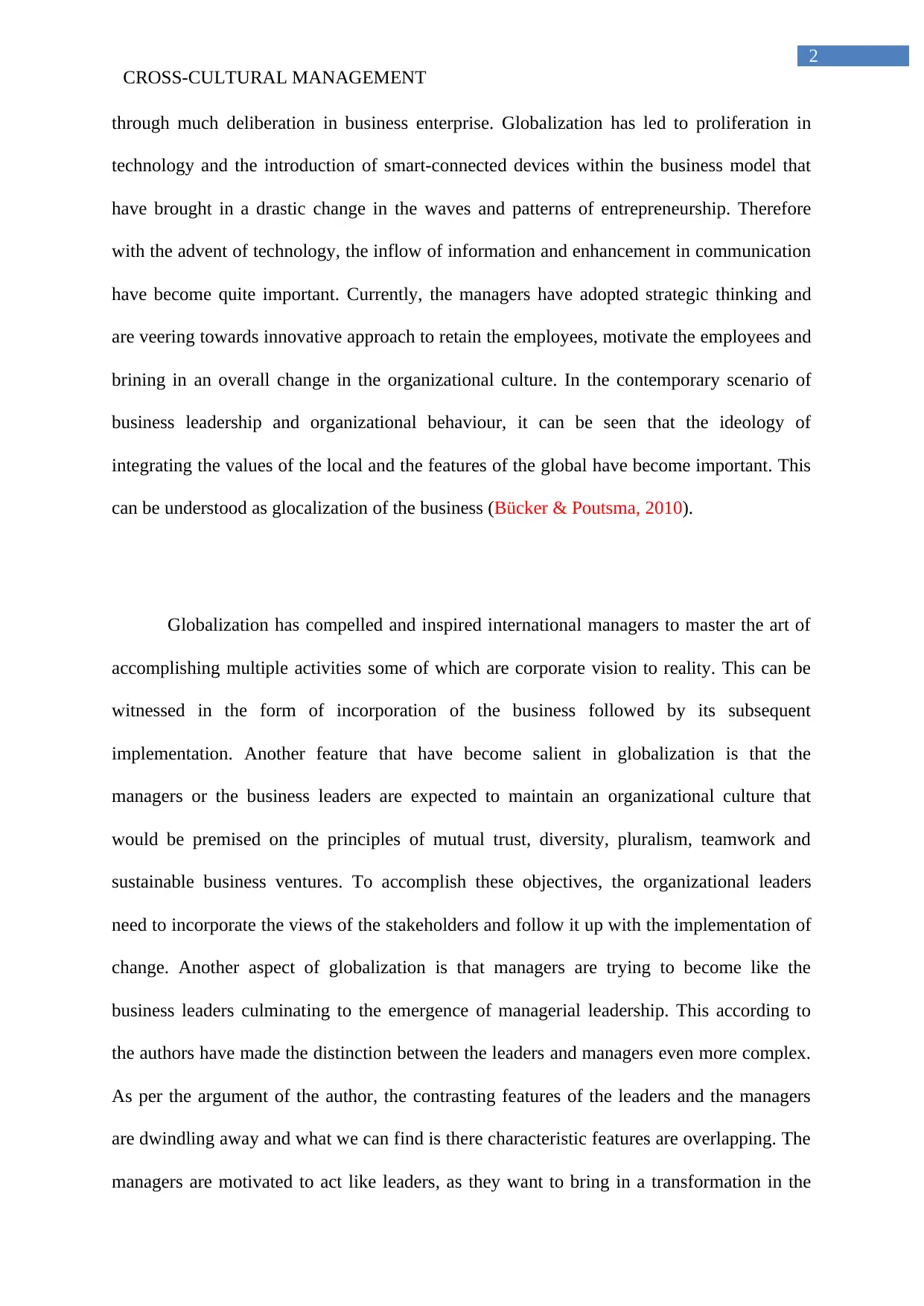
2
CROSS-CULTURAL MANAGEMENT
through much deliberation in business enterprise. Globalization has led to proliferation in
technology and the introduction of smart-connected devices within the business model that
have brought in a drastic change in the waves and patterns of entrepreneurship. Therefore
with the advent of technology, the inflow of information and enhancement in communication
have become quite important. Currently, the managers have adopted strategic thinking and
are veering towards innovative approach to retain the employees, motivate the employees and
brining in an overall change in the organizational culture. In the contemporary scenario of
business leadership and organizational behaviour, it can be seen that the ideology of
integrating the values of the local and the features of the global have become important. This
can be understood as glocalization of the business (Bücker & Poutsma, 2010).
Globalization has compelled and inspired international managers to master the art of
accomplishing multiple activities some of which are corporate vision to reality. This can be
witnessed in the form of incorporation of the business followed by its subsequent
implementation. Another feature that have become salient in globalization is that the
managers or the business leaders are expected to maintain an organizational culture that
would be premised on the principles of mutual trust, diversity, pluralism, teamwork and
sustainable business ventures. To accomplish these objectives, the organizational leaders
need to incorporate the views of the stakeholders and follow it up with the implementation of
change. Another aspect of globalization is that managers are trying to become like the
business leaders culminating to the emergence of managerial leadership. This according to
the authors have made the distinction between the leaders and managers even more complex.
As per the argument of the author, the contrasting features of the leaders and the managers
are dwindling away and what we can find is there characteristic features are overlapping. The
managers are motivated to act like leaders, as they want to bring in a transformation in the
CROSS-CULTURAL MANAGEMENT
through much deliberation in business enterprise. Globalization has led to proliferation in
technology and the introduction of smart-connected devices within the business model that
have brought in a drastic change in the waves and patterns of entrepreneurship. Therefore
with the advent of technology, the inflow of information and enhancement in communication
have become quite important. Currently, the managers have adopted strategic thinking and
are veering towards innovative approach to retain the employees, motivate the employees and
brining in an overall change in the organizational culture. In the contemporary scenario of
business leadership and organizational behaviour, it can be seen that the ideology of
integrating the values of the local and the features of the global have become important. This
can be understood as glocalization of the business (Bücker & Poutsma, 2010).
Globalization has compelled and inspired international managers to master the art of
accomplishing multiple activities some of which are corporate vision to reality. This can be
witnessed in the form of incorporation of the business followed by its subsequent
implementation. Another feature that have become salient in globalization is that the
managers or the business leaders are expected to maintain an organizational culture that
would be premised on the principles of mutual trust, diversity, pluralism, teamwork and
sustainable business ventures. To accomplish these objectives, the organizational leaders
need to incorporate the views of the stakeholders and follow it up with the implementation of
change. Another aspect of globalization is that managers are trying to become like the
business leaders culminating to the emergence of managerial leadership. This according to
the authors have made the distinction between the leaders and managers even more complex.
As per the argument of the author, the contrasting features of the leaders and the managers
are dwindling away and what we can find is there characteristic features are overlapping. The
managers are motivated to act like leaders, as they want to bring in a transformation in the
⊘ This is a preview!⊘
Do you want full access?
Subscribe today to unlock all pages.

Trusted by 1+ million students worldwide
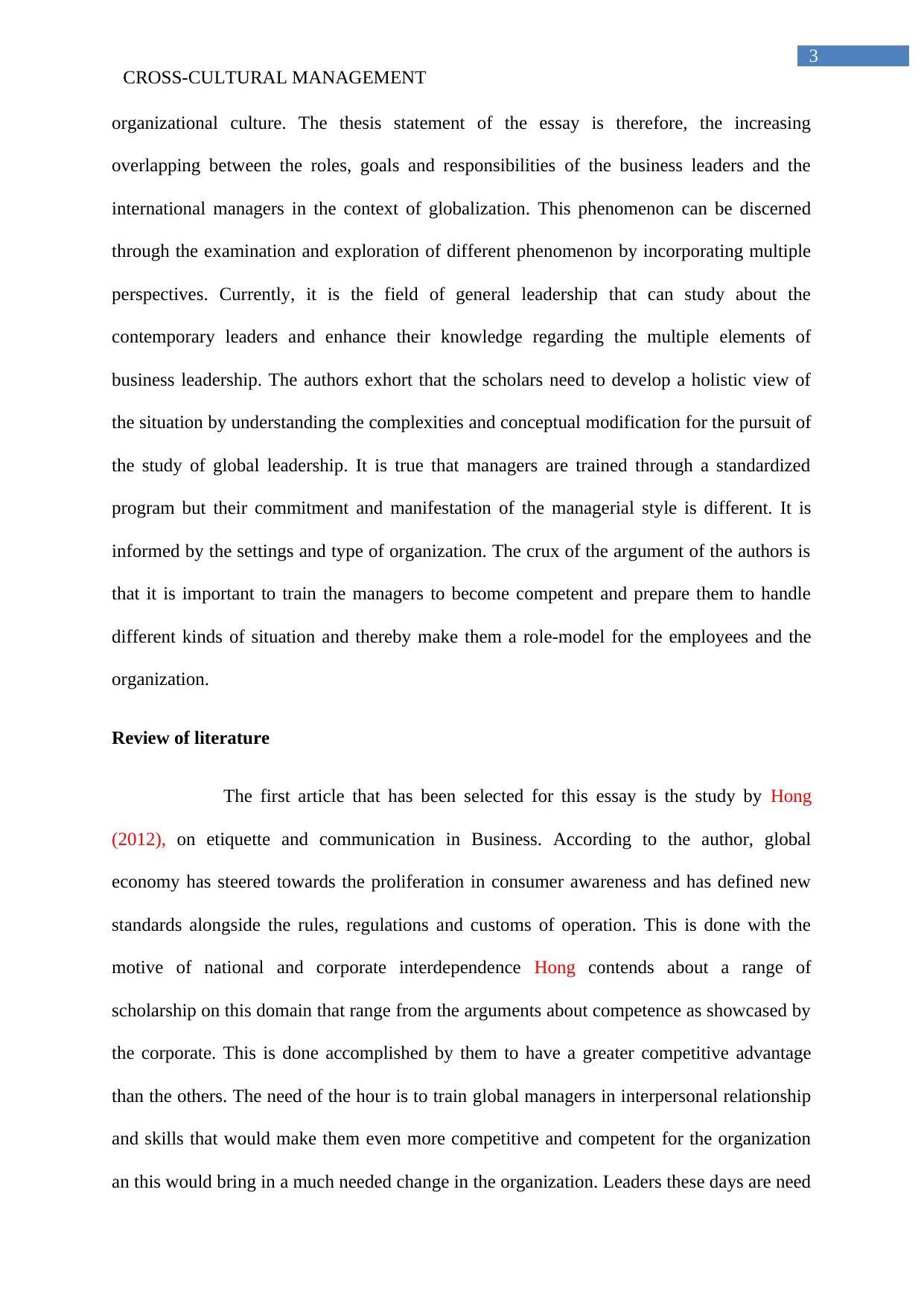
3
CROSS-CULTURAL MANAGEMENT
organizational culture. The thesis statement of the essay is therefore, the increasing
overlapping between the roles, goals and responsibilities of the business leaders and the
international managers in the context of globalization. This phenomenon can be discerned
through the examination and exploration of different phenomenon by incorporating multiple
perspectives. Currently, it is the field of general leadership that can study about the
contemporary leaders and enhance their knowledge regarding the multiple elements of
business leadership. The authors exhort that the scholars need to develop a holistic view of
the situation by understanding the complexities and conceptual modification for the pursuit of
the study of global leadership. It is true that managers are trained through a standardized
program but their commitment and manifestation of the managerial style is different. It is
informed by the settings and type of organization. The crux of the argument of the authors is
that it is important to train the managers to become competent and prepare them to handle
different kinds of situation and thereby make them a role-model for the employees and the
organization.
Review of literature
The first article that has been selected for this essay is the study by Hong
(2012), on etiquette and communication in Business. According to the author, global
economy has steered towards the proliferation in consumer awareness and has defined new
standards alongside the rules, regulations and customs of operation. This is done with the
motive of national and corporate interdependence Hong contends about a range of
scholarship on this domain that range from the arguments about competence as showcased by
the corporate. This is done accomplished by them to have a greater competitive advantage
than the others. The need of the hour is to train global managers in interpersonal relationship
and skills that would make them even more competitive and competent for the organization
an this would bring in a much needed change in the organization. Leaders these days are need
CROSS-CULTURAL MANAGEMENT
organizational culture. The thesis statement of the essay is therefore, the increasing
overlapping between the roles, goals and responsibilities of the business leaders and the
international managers in the context of globalization. This phenomenon can be discerned
through the examination and exploration of different phenomenon by incorporating multiple
perspectives. Currently, it is the field of general leadership that can study about the
contemporary leaders and enhance their knowledge regarding the multiple elements of
business leadership. The authors exhort that the scholars need to develop a holistic view of
the situation by understanding the complexities and conceptual modification for the pursuit of
the study of global leadership. It is true that managers are trained through a standardized
program but their commitment and manifestation of the managerial style is different. It is
informed by the settings and type of organization. The crux of the argument of the authors is
that it is important to train the managers to become competent and prepare them to handle
different kinds of situation and thereby make them a role-model for the employees and the
organization.
Review of literature
The first article that has been selected for this essay is the study by Hong
(2012), on etiquette and communication in Business. According to the author, global
economy has steered towards the proliferation in consumer awareness and has defined new
standards alongside the rules, regulations and customs of operation. This is done with the
motive of national and corporate interdependence Hong contends about a range of
scholarship on this domain that range from the arguments about competence as showcased by
the corporate. This is done accomplished by them to have a greater competitive advantage
than the others. The need of the hour is to train global managers in interpersonal relationship
and skills that would make them even more competitive and competent for the organization
an this would bring in a much needed change in the organization. Leaders these days are need
Paraphrase This Document
Need a fresh take? Get an instant paraphrase of this document with our AI Paraphraser
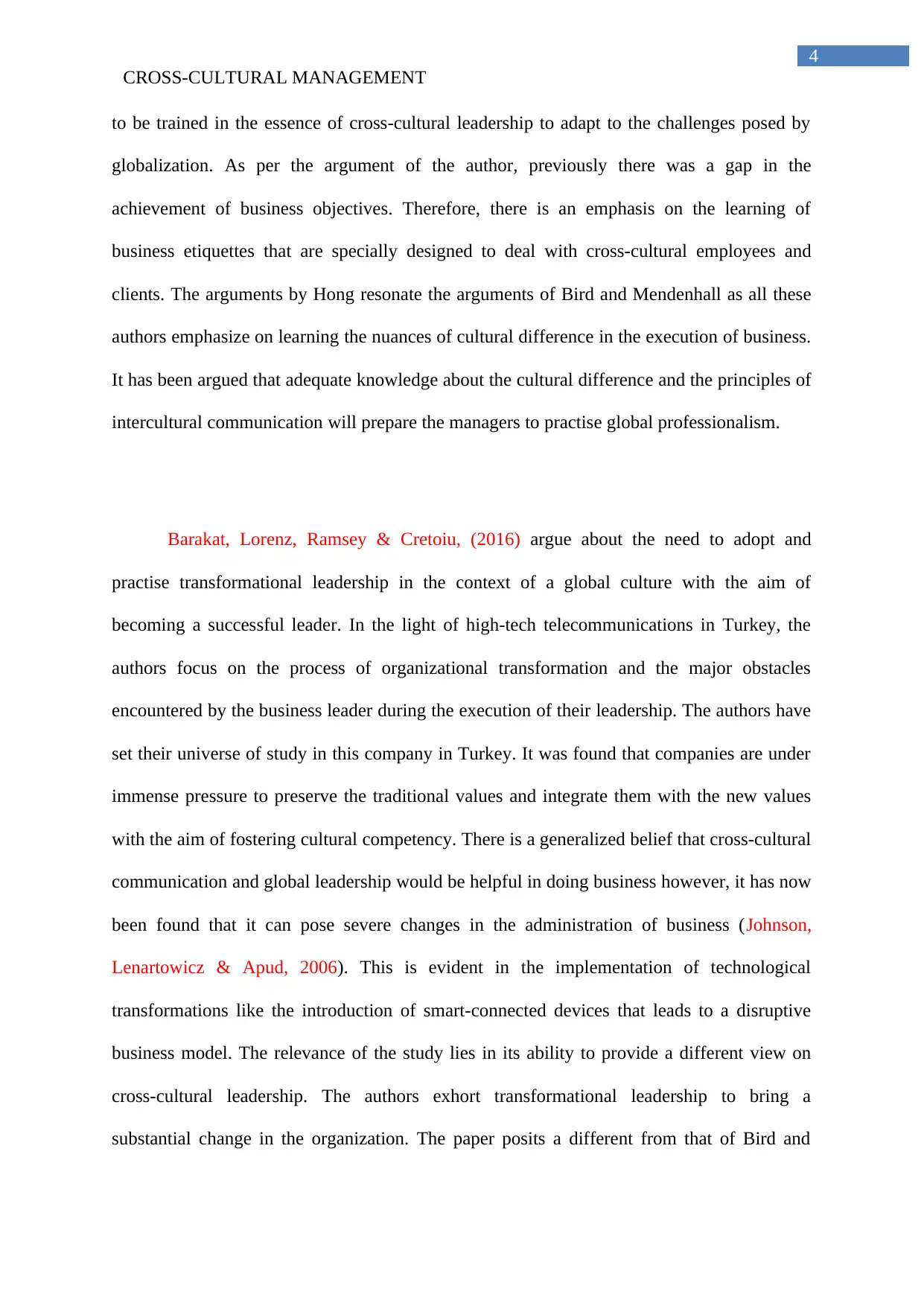
4
CROSS-CULTURAL MANAGEMENT
to be trained in the essence of cross-cultural leadership to adapt to the challenges posed by
globalization. As per the argument of the author, previously there was a gap in the
achievement of business objectives. Therefore, there is an emphasis on the learning of
business etiquettes that are specially designed to deal with cross-cultural employees and
clients. The arguments by Hong resonate the arguments of Bird and Mendenhall as all these
authors emphasize on learning the nuances of cultural difference in the execution of business.
It has been argued that adequate knowledge about the cultural difference and the principles of
intercultural communication will prepare the managers to practise global professionalism.
Barakat, Lorenz, Ramsey & Cretoiu, (2016) argue about the need to adopt and
practise transformational leadership in the context of a global culture with the aim of
becoming a successful leader. In the light of high-tech telecommunications in Turkey, the
authors focus on the process of organizational transformation and the major obstacles
encountered by the business leader during the execution of their leadership. The authors have
set their universe of study in this company in Turkey. It was found that companies are under
immense pressure to preserve the traditional values and integrate them with the new values
with the aim of fostering cultural competency. There is a generalized belief that cross-cultural
communication and global leadership would be helpful in doing business however, it has now
been found that it can pose severe changes in the administration of business (Johnson,
Lenartowicz & Apud, 2006). This is evident in the implementation of technological
transformations like the introduction of smart-connected devices that leads to a disruptive
business model. The relevance of the study lies in its ability to provide a different view on
cross-cultural leadership. The authors exhort transformational leadership to bring a
substantial change in the organization. The paper posits a different from that of Bird and
CROSS-CULTURAL MANAGEMENT
to be trained in the essence of cross-cultural leadership to adapt to the challenges posed by
globalization. As per the argument of the author, previously there was a gap in the
achievement of business objectives. Therefore, there is an emphasis on the learning of
business etiquettes that are specially designed to deal with cross-cultural employees and
clients. The arguments by Hong resonate the arguments of Bird and Mendenhall as all these
authors emphasize on learning the nuances of cultural difference in the execution of business.
It has been argued that adequate knowledge about the cultural difference and the principles of
intercultural communication will prepare the managers to practise global professionalism.
Barakat, Lorenz, Ramsey & Cretoiu, (2016) argue about the need to adopt and
practise transformational leadership in the context of a global culture with the aim of
becoming a successful leader. In the light of high-tech telecommunications in Turkey, the
authors focus on the process of organizational transformation and the major obstacles
encountered by the business leader during the execution of their leadership. The authors have
set their universe of study in this company in Turkey. It was found that companies are under
immense pressure to preserve the traditional values and integrate them with the new values
with the aim of fostering cultural competency. There is a generalized belief that cross-cultural
communication and global leadership would be helpful in doing business however, it has now
been found that it can pose severe changes in the administration of business (Johnson,
Lenartowicz & Apud, 2006). This is evident in the implementation of technological
transformations like the introduction of smart-connected devices that leads to a disruptive
business model. The relevance of the study lies in its ability to provide a different view on
cross-cultural leadership. The authors exhort transformational leadership to bring a
substantial change in the organization. The paper posits a different from that of Bird and
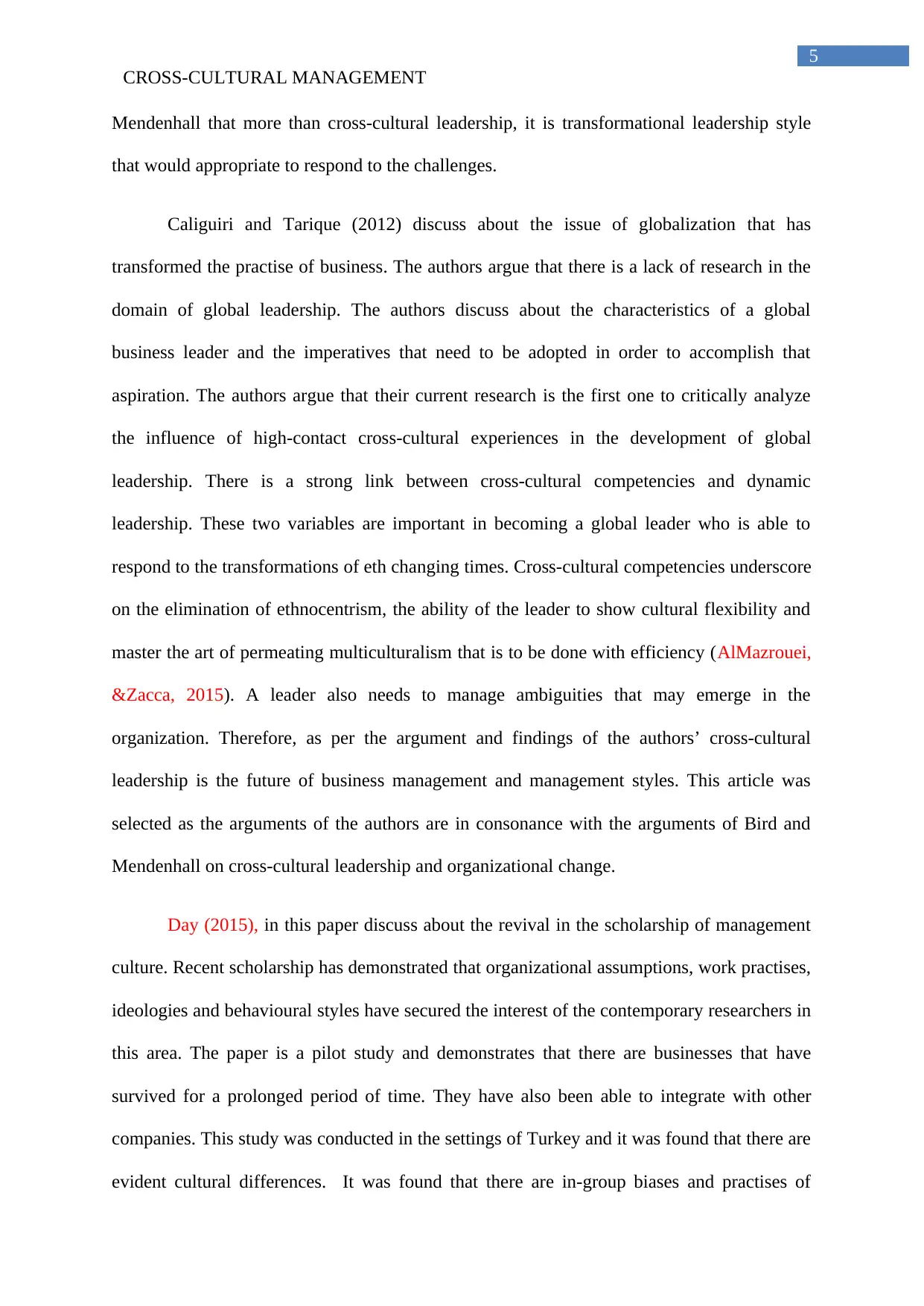
5
CROSS-CULTURAL MANAGEMENT
Mendenhall that more than cross-cultural leadership, it is transformational leadership style
that would appropriate to respond to the challenges.
Caliguiri and Tarique (2012) discuss about the issue of globalization that has
transformed the practise of business. The authors argue that there is a lack of research in the
domain of global leadership. The authors discuss about the characteristics of a global
business leader and the imperatives that need to be adopted in order to accomplish that
aspiration. The authors argue that their current research is the first one to critically analyze
the influence of high-contact cross-cultural experiences in the development of global
leadership. There is a strong link between cross-cultural competencies and dynamic
leadership. These two variables are important in becoming a global leader who is able to
respond to the transformations of eth changing times. Cross-cultural competencies underscore
on the elimination of ethnocentrism, the ability of the leader to show cultural flexibility and
master the art of permeating multiculturalism that is to be done with efficiency (AlMazrouei,
&Zacca, 2015). A leader also needs to manage ambiguities that may emerge in the
organization. Therefore, as per the argument and findings of the authors’ cross-cultural
leadership is the future of business management and management styles. This article was
selected as the arguments of the authors are in consonance with the arguments of Bird and
Mendenhall on cross-cultural leadership and organizational change.
Day (2015), in this paper discuss about the revival in the scholarship of management
culture. Recent scholarship has demonstrated that organizational assumptions, work practises,
ideologies and behavioural styles have secured the interest of the contemporary researchers in
this area. The paper is a pilot study and demonstrates that there are businesses that have
survived for a prolonged period of time. They have also been able to integrate with other
companies. This study was conducted in the settings of Turkey and it was found that there are
evident cultural differences. It was found that there are in-group biases and practises of
CROSS-CULTURAL MANAGEMENT
Mendenhall that more than cross-cultural leadership, it is transformational leadership style
that would appropriate to respond to the challenges.
Caliguiri and Tarique (2012) discuss about the issue of globalization that has
transformed the practise of business. The authors argue that there is a lack of research in the
domain of global leadership. The authors discuss about the characteristics of a global
business leader and the imperatives that need to be adopted in order to accomplish that
aspiration. The authors argue that their current research is the first one to critically analyze
the influence of high-contact cross-cultural experiences in the development of global
leadership. There is a strong link between cross-cultural competencies and dynamic
leadership. These two variables are important in becoming a global leader who is able to
respond to the transformations of eth changing times. Cross-cultural competencies underscore
on the elimination of ethnocentrism, the ability of the leader to show cultural flexibility and
master the art of permeating multiculturalism that is to be done with efficiency (AlMazrouei,
&Zacca, 2015). A leader also needs to manage ambiguities that may emerge in the
organization. Therefore, as per the argument and findings of the authors’ cross-cultural
leadership is the future of business management and management styles. This article was
selected as the arguments of the authors are in consonance with the arguments of Bird and
Mendenhall on cross-cultural leadership and organizational change.
Day (2015), in this paper discuss about the revival in the scholarship of management
culture. Recent scholarship has demonstrated that organizational assumptions, work practises,
ideologies and behavioural styles have secured the interest of the contemporary researchers in
this area. The paper is a pilot study and demonstrates that there are businesses that have
survived for a prolonged period of time. They have also been able to integrate with other
companies. This study was conducted in the settings of Turkey and it was found that there are
evident cultural differences. It was found that there are in-group biases and practises of
⊘ This is a preview!⊘
Do you want full access?
Subscribe today to unlock all pages.

Trusted by 1+ million students worldwide
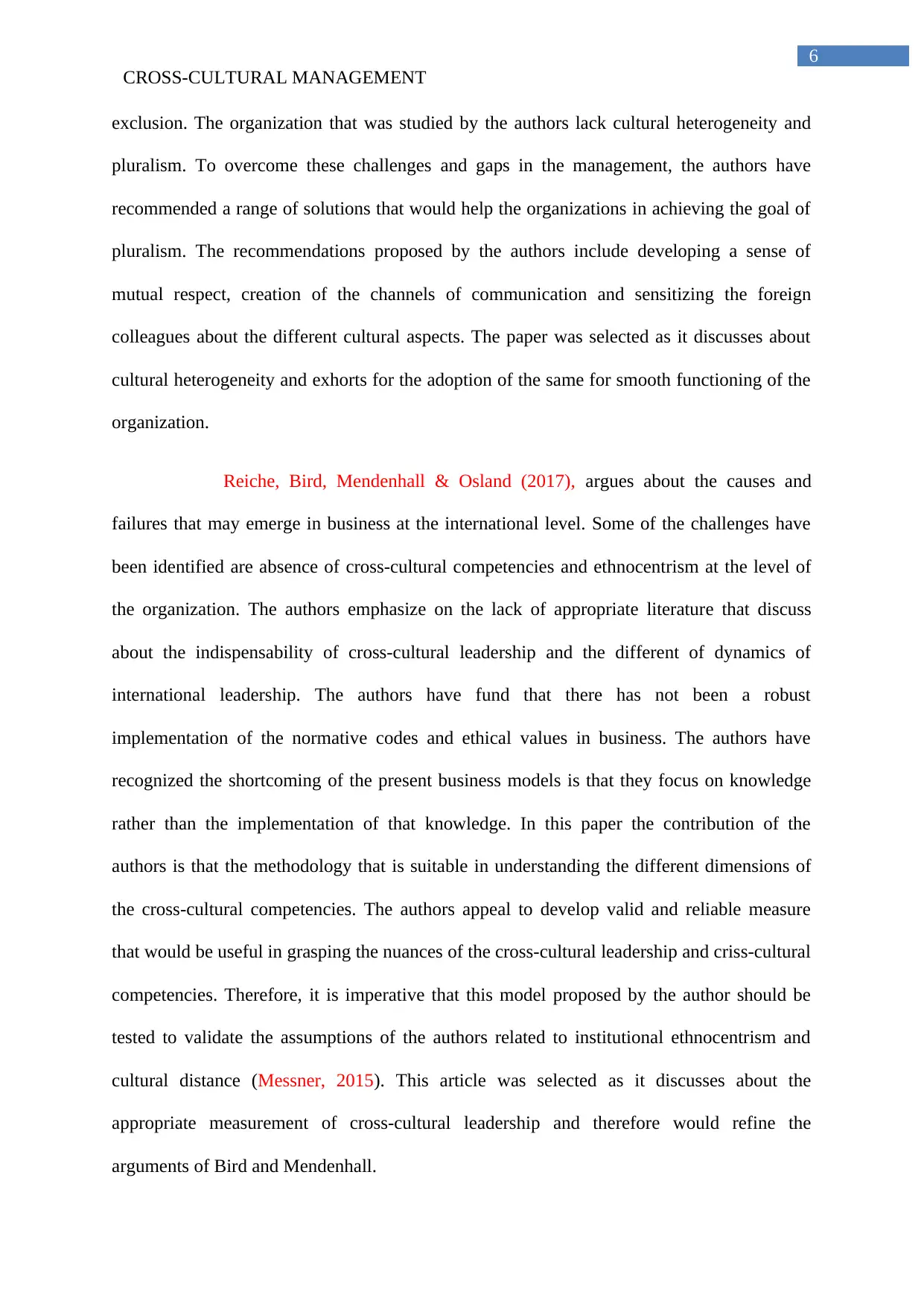
6
CROSS-CULTURAL MANAGEMENT
exclusion. The organization that was studied by the authors lack cultural heterogeneity and
pluralism. To overcome these challenges and gaps in the management, the authors have
recommended a range of solutions that would help the organizations in achieving the goal of
pluralism. The recommendations proposed by the authors include developing a sense of
mutual respect, creation of the channels of communication and sensitizing the foreign
colleagues about the different cultural aspects. The paper was selected as it discusses about
cultural heterogeneity and exhorts for the adoption of the same for smooth functioning of the
organization.
Reiche, Bird, Mendenhall & Osland (2017), argues about the causes and
failures that may emerge in business at the international level. Some of the challenges have
been identified are absence of cross-cultural competencies and ethnocentrism at the level of
the organization. The authors emphasize on the lack of appropriate literature that discuss
about the indispensability of cross-cultural leadership and the different of dynamics of
international leadership. The authors have fund that there has not been a robust
implementation of the normative codes and ethical values in business. The authors have
recognized the shortcoming of the present business models is that they focus on knowledge
rather than the implementation of that knowledge. In this paper the contribution of the
authors is that the methodology that is suitable in understanding the different dimensions of
the cross-cultural competencies. The authors appeal to develop valid and reliable measure
that would be useful in grasping the nuances of the cross-cultural leadership and criss-cultural
competencies. Therefore, it is imperative that this model proposed by the author should be
tested to validate the assumptions of the authors related to institutional ethnocentrism and
cultural distance (Messner, 2015). This article was selected as it discusses about the
appropriate measurement of cross-cultural leadership and therefore would refine the
arguments of Bird and Mendenhall.
CROSS-CULTURAL MANAGEMENT
exclusion. The organization that was studied by the authors lack cultural heterogeneity and
pluralism. To overcome these challenges and gaps in the management, the authors have
recommended a range of solutions that would help the organizations in achieving the goal of
pluralism. The recommendations proposed by the authors include developing a sense of
mutual respect, creation of the channels of communication and sensitizing the foreign
colleagues about the different cultural aspects. The paper was selected as it discusses about
cultural heterogeneity and exhorts for the adoption of the same for smooth functioning of the
organization.
Reiche, Bird, Mendenhall & Osland (2017), argues about the causes and
failures that may emerge in business at the international level. Some of the challenges have
been identified are absence of cross-cultural competencies and ethnocentrism at the level of
the organization. The authors emphasize on the lack of appropriate literature that discuss
about the indispensability of cross-cultural leadership and the different of dynamics of
international leadership. The authors have fund that there has not been a robust
implementation of the normative codes and ethical values in business. The authors have
recognized the shortcoming of the present business models is that they focus on knowledge
rather than the implementation of that knowledge. In this paper the contribution of the
authors is that the methodology that is suitable in understanding the different dimensions of
the cross-cultural competencies. The authors appeal to develop valid and reliable measure
that would be useful in grasping the nuances of the cross-cultural leadership and criss-cultural
competencies. Therefore, it is imperative that this model proposed by the author should be
tested to validate the assumptions of the authors related to institutional ethnocentrism and
cultural distance (Messner, 2015). This article was selected as it discusses about the
appropriate measurement of cross-cultural leadership and therefore would refine the
arguments of Bird and Mendenhall.
Paraphrase This Document
Need a fresh take? Get an instant paraphrase of this document with our AI Paraphraser
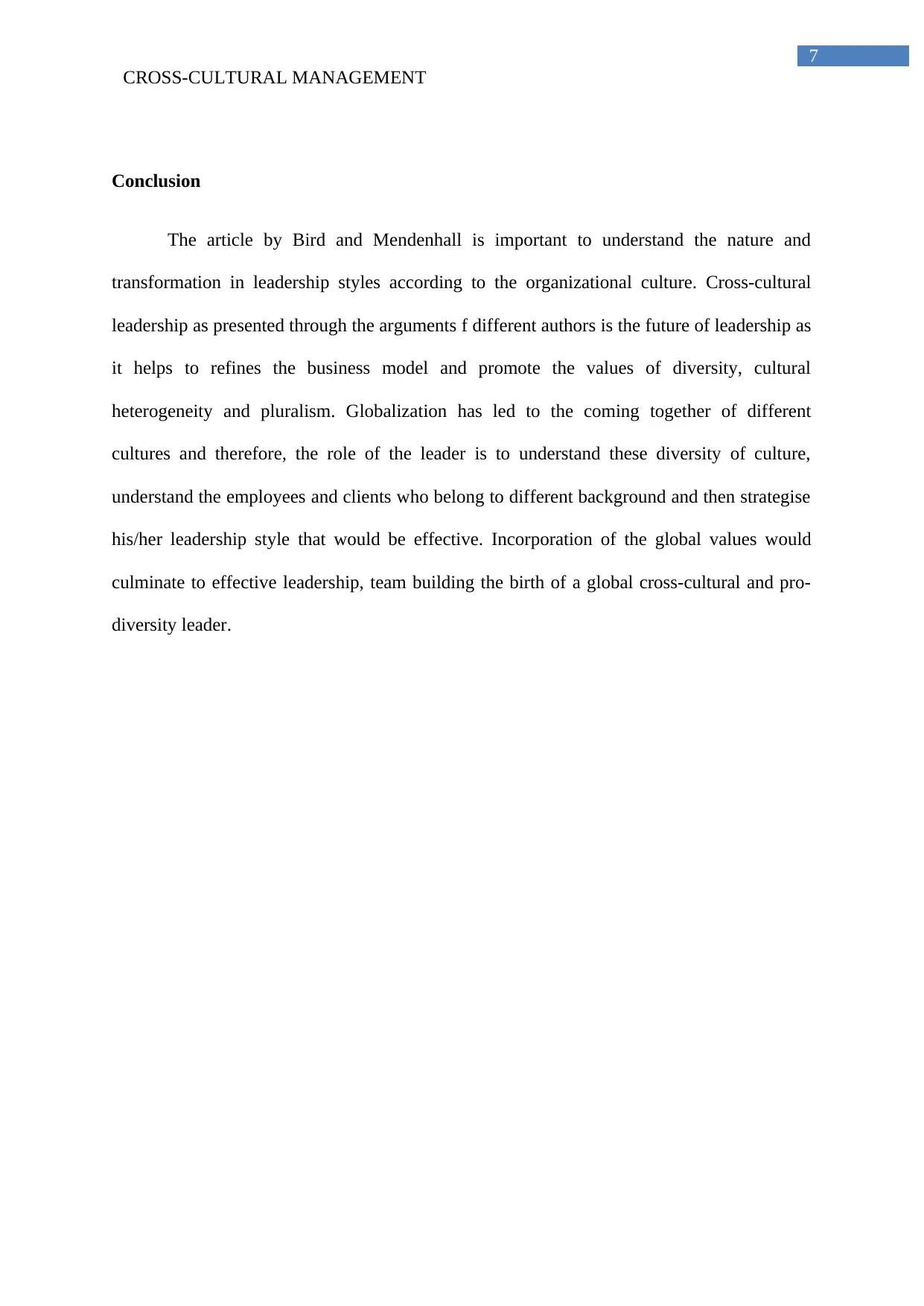
7
CROSS-CULTURAL MANAGEMENT
Conclusion
The article by Bird and Mendenhall is important to understand the nature and
transformation in leadership styles according to the organizational culture. Cross-cultural
leadership as presented through the arguments f different authors is the future of leadership as
it helps to refines the business model and promote the values of diversity, cultural
heterogeneity and pluralism. Globalization has led to the coming together of different
cultures and therefore, the role of the leader is to understand these diversity of culture,
understand the employees and clients who belong to different background and then strategise
his/her leadership style that would be effective. Incorporation of the global values would
culminate to effective leadership, team building the birth of a global cross-cultural and pro-
diversity leader.
CROSS-CULTURAL MANAGEMENT
Conclusion
The article by Bird and Mendenhall is important to understand the nature and
transformation in leadership styles according to the organizational culture. Cross-cultural
leadership as presented through the arguments f different authors is the future of leadership as
it helps to refines the business model and promote the values of diversity, cultural
heterogeneity and pluralism. Globalization has led to the coming together of different
cultures and therefore, the role of the leader is to understand these diversity of culture,
understand the employees and clients who belong to different background and then strategise
his/her leadership style that would be effective. Incorporation of the global values would
culminate to effective leadership, team building the birth of a global cross-cultural and pro-
diversity leader.
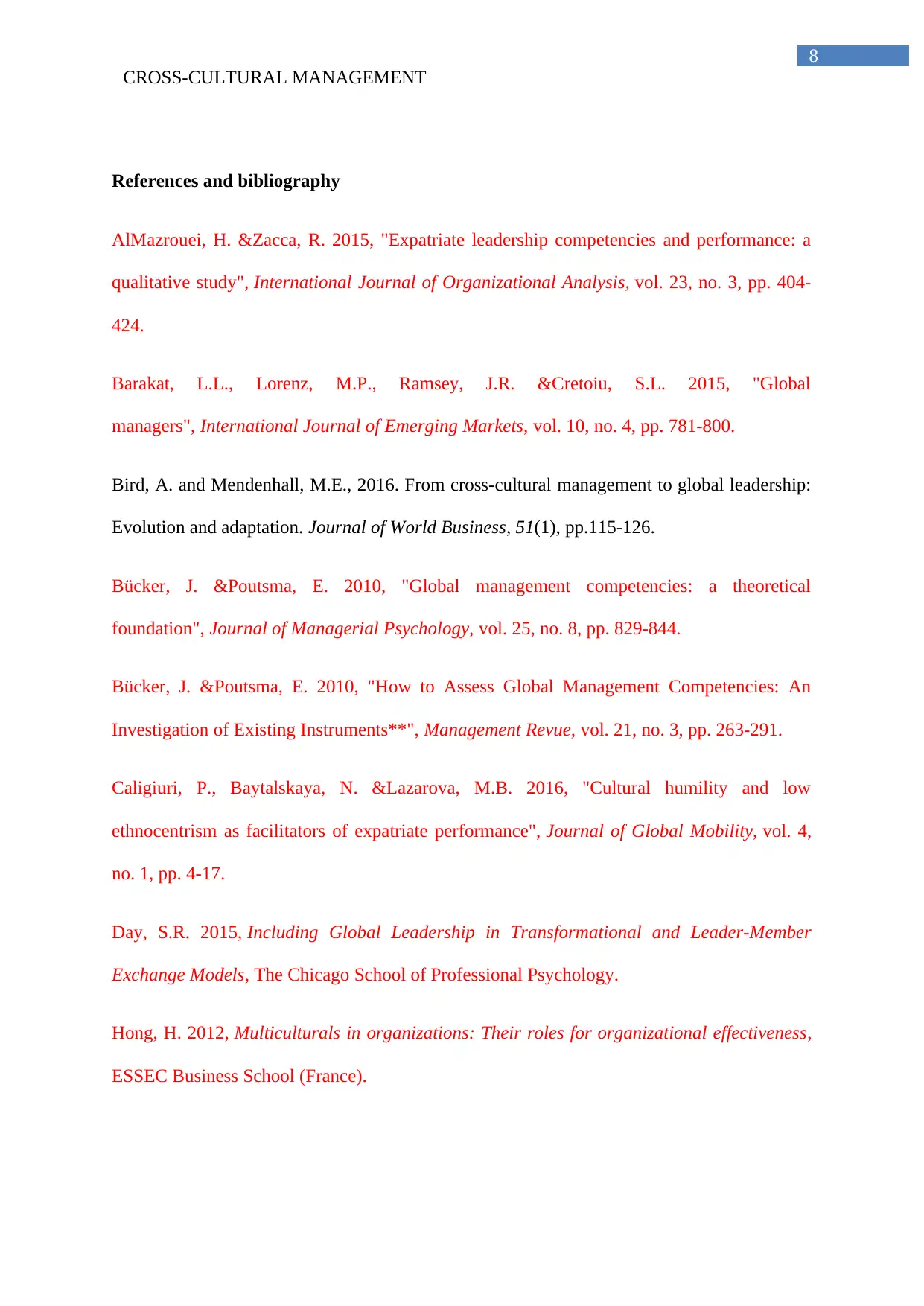
8
CROSS-CULTURAL MANAGEMENT
References and bibliography
AlMazrouei, H. &Zacca, R. 2015, "Expatriate leadership competencies and performance: a
qualitative study", International Journal of Organizational Analysis, vol. 23, no. 3, pp. 404-
424.
Barakat, L.L., Lorenz, M.P., Ramsey, J.R. &Cretoiu, S.L. 2015, "Global
managers", International Journal of Emerging Markets, vol. 10, no. 4, pp. 781-800.
Bird, A. and Mendenhall, M.E., 2016. From cross-cultural management to global leadership:
Evolution and adaptation. Journal of World Business, 51(1), pp.115-126.
Bücker, J. &Poutsma, E. 2010, "Global management competencies: a theoretical
foundation", Journal of Managerial Psychology, vol. 25, no. 8, pp. 829-844.
Bücker, J. &Poutsma, E. 2010, "How to Assess Global Management Competencies: An
Investigation of Existing Instruments**", Management Revue, vol. 21, no. 3, pp. 263-291.
Caligiuri, P., Baytalskaya, N. &Lazarova, M.B. 2016, "Cultural humility and low
ethnocentrism as facilitators of expatriate performance", Journal of Global Mobility, vol. 4,
no. 1, pp. 4-17.
Day, S.R. 2015, Including Global Leadership in Transformational and Leader-Member
Exchange Models, The Chicago School of Professional Psychology.
Hong, H. 2012, Multiculturals in organizations: Their roles for organizational effectiveness,
ESSEC Business School (France).
CROSS-CULTURAL MANAGEMENT
References and bibliography
AlMazrouei, H. &Zacca, R. 2015, "Expatriate leadership competencies and performance: a
qualitative study", International Journal of Organizational Analysis, vol. 23, no. 3, pp. 404-
424.
Barakat, L.L., Lorenz, M.P., Ramsey, J.R. &Cretoiu, S.L. 2015, "Global
managers", International Journal of Emerging Markets, vol. 10, no. 4, pp. 781-800.
Bird, A. and Mendenhall, M.E., 2016. From cross-cultural management to global leadership:
Evolution and adaptation. Journal of World Business, 51(1), pp.115-126.
Bücker, J. &Poutsma, E. 2010, "Global management competencies: a theoretical
foundation", Journal of Managerial Psychology, vol. 25, no. 8, pp. 829-844.
Bücker, J. &Poutsma, E. 2010, "How to Assess Global Management Competencies: An
Investigation of Existing Instruments**", Management Revue, vol. 21, no. 3, pp. 263-291.
Caligiuri, P., Baytalskaya, N. &Lazarova, M.B. 2016, "Cultural humility and low
ethnocentrism as facilitators of expatriate performance", Journal of Global Mobility, vol. 4,
no. 1, pp. 4-17.
Day, S.R. 2015, Including Global Leadership in Transformational and Leader-Member
Exchange Models, The Chicago School of Professional Psychology.
Hong, H. 2012, Multiculturals in organizations: Their roles for organizational effectiveness,
ESSEC Business School (France).
⊘ This is a preview!⊘
Do you want full access?
Subscribe today to unlock all pages.

Trusted by 1+ million students worldwide
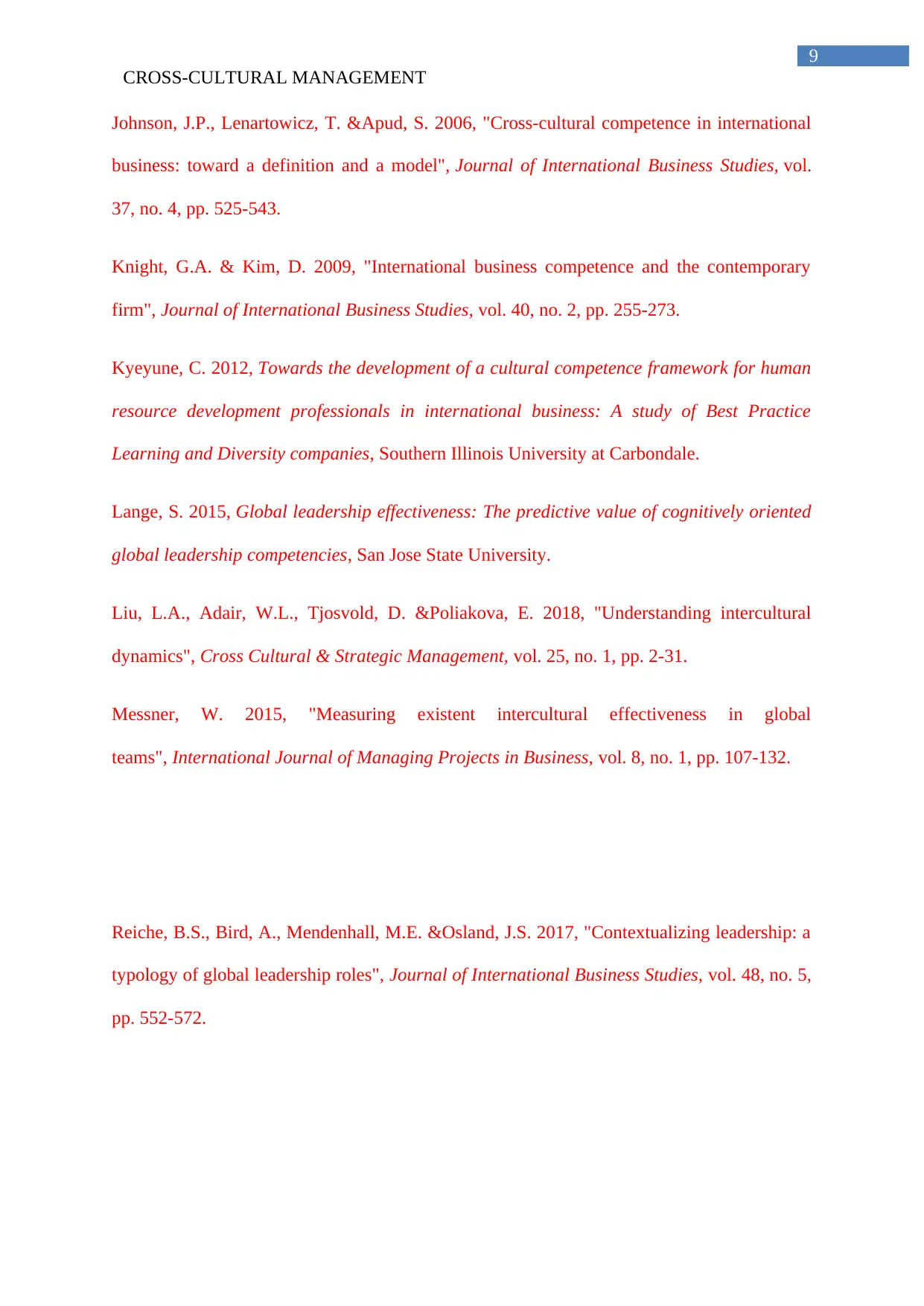
9
CROSS-CULTURAL MANAGEMENT
Johnson, J.P., Lenartowicz, T. &Apud, S. 2006, "Cross-cultural competence in international
business: toward a definition and a model", Journal of International Business Studies, vol.
37, no. 4, pp. 525-543.
Knight, G.A. & Kim, D. 2009, "International business competence and the contemporary
firm", Journal of International Business Studies, vol. 40, no. 2, pp. 255-273.
Kyeyune, C. 2012, Towards the development of a cultural competence framework for human
resource development professionals in international business: A study of Best Practice
Learning and Diversity companies, Southern Illinois University at Carbondale.
Lange, S. 2015, Global leadership effectiveness: The predictive value of cognitively oriented
global leadership competencies, San Jose State University.
Liu, L.A., Adair, W.L., Tjosvold, D. &Poliakova, E. 2018, "Understanding intercultural
dynamics", Cross Cultural & Strategic Management, vol. 25, no. 1, pp. 2-31.
Messner, W. 2015, "Measuring existent intercultural effectiveness in global
teams", International Journal of Managing Projects in Business, vol. 8, no. 1, pp. 107-132.
Reiche, B.S., Bird, A., Mendenhall, M.E. &Osland, J.S. 2017, "Contextualizing leadership: a
typology of global leadership roles", Journal of International Business Studies, vol. 48, no. 5,
pp. 552-572.
CROSS-CULTURAL MANAGEMENT
Johnson, J.P., Lenartowicz, T. &Apud, S. 2006, "Cross-cultural competence in international
business: toward a definition and a model", Journal of International Business Studies, vol.
37, no. 4, pp. 525-543.
Knight, G.A. & Kim, D. 2009, "International business competence and the contemporary
firm", Journal of International Business Studies, vol. 40, no. 2, pp. 255-273.
Kyeyune, C. 2012, Towards the development of a cultural competence framework for human
resource development professionals in international business: A study of Best Practice
Learning and Diversity companies, Southern Illinois University at Carbondale.
Lange, S. 2015, Global leadership effectiveness: The predictive value of cognitively oriented
global leadership competencies, San Jose State University.
Liu, L.A., Adair, W.L., Tjosvold, D. &Poliakova, E. 2018, "Understanding intercultural
dynamics", Cross Cultural & Strategic Management, vol. 25, no. 1, pp. 2-31.
Messner, W. 2015, "Measuring existent intercultural effectiveness in global
teams", International Journal of Managing Projects in Business, vol. 8, no. 1, pp. 107-132.
Reiche, B.S., Bird, A., Mendenhall, M.E. &Osland, J.S. 2017, "Contextualizing leadership: a
typology of global leadership roles", Journal of International Business Studies, vol. 48, no. 5,
pp. 552-572.
Paraphrase This Document
Need a fresh take? Get an instant paraphrase of this document with our AI Paraphraser
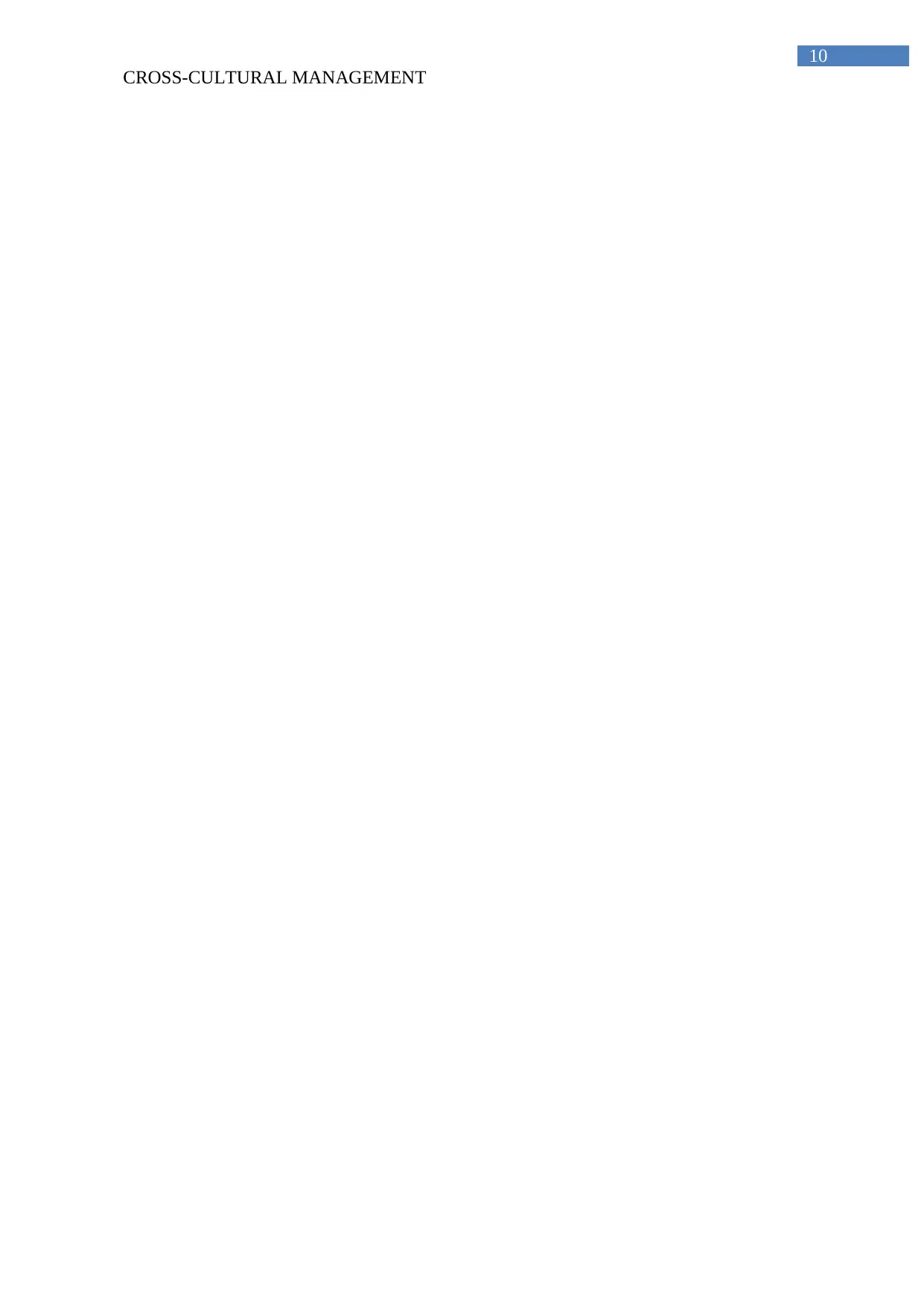
10
CROSS-CULTURAL MANAGEMENT
CROSS-CULTURAL MANAGEMENT
1 out of 11
Related Documents
Your All-in-One AI-Powered Toolkit for Academic Success.
+13062052269
info@desklib.com
Available 24*7 on WhatsApp / Email
![[object Object]](/_next/static/media/star-bottom.7253800d.svg)
Unlock your academic potential
Copyright © 2020–2026 A2Z Services. All Rights Reserved. Developed and managed by ZUCOL.




